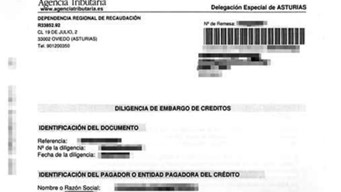Seizure proceedings
It is very common that the Tax agency issue a credit seizure procedure to paying companies of the debtor to be garnished, if it knows or has indications that it maintains a commercial relationship with the supplier on whom the seizure falls. Therefore, what should you take into account if you receive one?
First of all, we must point out that, according to what the Tax Agency itself indicates, the embargo is that phase where "the collection of debts is carried out through the execution of assets owned by the debtor, issuing the corresponding seizure proceedings, to obtain the amount of the debts plus surcharges, interests and costs through these assets.
This embargo phase begins once the voluntary period for payment has elapsed of the tax fee/debt and the corresponding providence of urgency pursuant to article 65 of the General Tax Law (LGT).
Thus, it can be highlighted that embargoes can be different nature and characteristics and all of this will depend on the seizure procedure received. For example, liens may include:
- Cash or money in accounts at credit institutions.
- Credits, effects, securities and rights realizable immediately or in the short term.
- Wages, salaries and pensions.
- Estate.
- Interest, income and fruits of all kinds.
- Commercial or industrial establishments.
- Precious metals, jewelry and antiques.
- Movable or livestock property.
- Long-term credits, effects, securities and rights.
Needless to say, in the case we are interested in, The company that receives the seizure procedure is the paying party towards the supplier (debtor to be seized by the Tax Agency), Therefore, the credit seizure procedure will deal with those pending payments that may exist in favor of the supplier in question and that, from the moment the seizure procedure is received, said payment is seized in favor of the Tax Agency.
This is indicated by the Tax Agency when mentioning that "if a seizure procedure is received from another person or entity, this will occur because there is or has been a relationship with that person or entity and therefore it is received as a "payer." ”. In this case, it will be necessary and obligatory to respond to the diligence received and, where appropriate, enter into the AEAT the payments that must be made to the person or entity indicated in the diligence.

Source: Google
Therefore, pending payments that may have existed as a consequence of the acquisition of goods or services from a specific supplier, will be seized and payment will be made to the Tax Agency, instead of to the supplier in question, and thus the seizure procedure must be answered to notify the Tax Agency of the total balance seized, which may coincide with the total balance or be less than it.
In this case, and as indicated by the Tax Agency, "the recipient of the diligence (the company or third party) The debtor is released from the payment obligation since the amount has already been deposited in the AEAT.
Therefore, in this case, he embargo has a liberatory nature, so the supplier will not be able to demand payment of the corresponding amount once said payment has been made to the Tax Agency.
It should be noted that, in accounting, a seizure of credits towards a supplier does not will produce notable effects in accounting, since it is a flow of cash movements in the treasury in the supplier's account, so the payment to the Tax Agency will be charged directly against it.
Don't miss all the latest news in the Financial area from the best professionals in the sector in our Master in Financial Management, Accounting and Management Control.




































